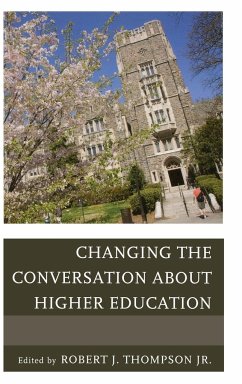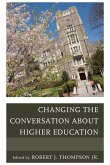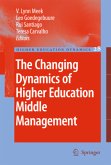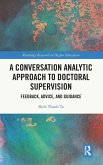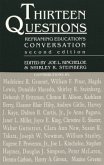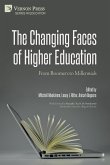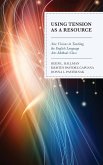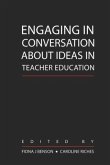Robert Thompson
Changing the Conversation about Higher Education
Robert Thompson
Changing the Conversation about Higher Education
- Gebundenes Buch
- Merkliste
- Auf die Merkliste
- Bewerten Bewerten
- Teilen
- Produkt teilen
- Produkterinnerung
- Produkterinnerung
The book is structured to address the issues of vision, structure, and cultural transformation that are of specific interest to academic administrators and the promising practices and issues of identity and support that are concerns of faculty and graduate students.
Andere Kunden interessierten sich auch für
![Changing the Conversation about Higher Education Changing the Conversation about Higher Education]() Robert ThompsonChanging the Conversation about Higher Education54,99 €
Robert ThompsonChanging the Conversation about Higher Education54,99 €![The Changing Dynamics of Higher Education Middle Management The Changing Dynamics of Higher Education Middle Management]() The Changing Dynamics of Higher Education Middle Management76,99 €
The Changing Dynamics of Higher Education Middle Management76,99 €![A Conversation Analytic Approach to Doctoral Supervision A Conversation Analytic Approach to Doctoral Supervision]() Binh Thanh TaA Conversation Analytic Approach to Doctoral Supervision149,99 €
Binh Thanh TaA Conversation Analytic Approach to Doctoral Supervision149,99 €![Thirteen Questions Thirteen Questions]() Thirteen Questions30,90 €
Thirteen Questions30,90 €![The Changing Faces of Higher Education The Changing Faces of Higher Education]() The Changing Faces of Higher Education54,99 €
The Changing Faces of Higher Education54,99 €![Using Tension as a Resource Using Tension as a Resource]() Using Tension as a Resource85,99 €
Using Tension as a Resource85,99 €![Engaging in Conversation about Ideas in Teacher Education Engaging in Conversation about Ideas in Teacher Education]() Engaging in Conversation about Ideas in Teacher Education116,40 €
Engaging in Conversation about Ideas in Teacher Education116,40 €-
-
-
The book is structured to address the issues of vision, structure, and cultural transformation that are of specific interest to academic administrators and the promising practices and issues of identity and support that are concerns of faculty and graduate students.
Produktdetails
- Produktdetails
- Verlag: R&L Education
- Seitenzahl: 240
- Erscheinungstermin: 4. März 2013
- Englisch
- Abmessung: 235mm x 157mm x 19mm
- Gewicht: 546g
- ISBN-13: 9781475801842
- ISBN-10: 147580184X
- Artikelnr.: 36907707
- Herstellerkennzeichnung
- Libri GmbH
- Europaallee 1
- 36244 Bad Hersfeld
- gpsr@libri.de
- Verlag: R&L Education
- Seitenzahl: 240
- Erscheinungstermin: 4. März 2013
- Englisch
- Abmessung: 235mm x 157mm x 19mm
- Gewicht: 546g
- ISBN-13: 9781475801842
- ISBN-10: 147580184X
- Artikelnr.: 36907707
- Herstellerkennzeichnung
- Libri GmbH
- Europaallee 1
- 36244 Bad Hersfeld
- gpsr@libri.de
Just an artist contentedly living in Alaska since 1967. Married to the bravest person I know.
Table of Contents
Forward:
Derek Bok, President Emeritus, Harvard University
Preface:
Content Overview:
Acknowledgements:
Contributors:
Introduction:
Robert J. Thompson, Jr., Duke University
Part One: Effective Teaching and Learning Practices
Chapter 1. From Bottlenecks to Epistemology in History: Changing the
Conversation
about the Teaching of History in Colleges and Universities
Leah Shopkow with Arlene Diaz, Joan Middendorf, and David Pace
Indiana University
Chapter 2. Using Scaffolding and Metacognitive Processes to Improve
Critical Thinking
in the Disciplines
Andrea Follmer Greenhoot, University of Kansas
Chapter 3. Think like/write like: Metacognitive Strategies to Foster
Students' Development
as Disciplinary Thinkers and Writers
Deborah Meizlish, Danielle LaVaque-Manty, Naomi Silver, and Matthew Kaplan
University of Michigan
Chapter 4. How Writing-to-Learn Practices Improve Student Learning:
Connecting
Research and Practice through a Consideration of Mechanisms of Effect
Christopher Thaiss,University of California-Davis
Julie Reynolds, Duke University
Part Two: Approaches to Assessment
Chapter 5. Assessment Approaches and Perspectives: Engaging Faculty and
Improving Student Learning
Jessica L. Jonson, Ph.D., University of Nebraska-Lincoln
Robert J. Thompson, Jr., Ph.D., Duke University
Chapter 6. Developing a Process for Assessing General Education Learning
Outcomes
Across a Multi-College University
Erin Blankenship, Shari J. Stenberg, and David E. Wilson
University of Nebraska-Lincoln
Chapter 7. Disciplinary-Specific Thesis Assessment Protocol: A Validated
Rubric
that Promotes Student Learning and Faculty Development
Julie Reynolds, Duke University
Part Three: The Role of University Centers: Professional Learning
Communities
Chapter 8. Teaching and Learning Centers as Professional Learning
Communities
Daniel Bernstein, University of Kansas
Chapter 9. Amplifying the Impact of Pedagogical Research: The Role of
Teaching
Centers and Writing Centers
Matthew Kaplan, Deborah Meizlish, Naomi Silver, and Danielle LaVaque-Manty,
University of Michigan
Part Four: Next Steps in the Continuing Efforts to Transform the Culture of
Undergraduate Education
Chapter 10. Systematic to Systemic: A Heuristic Framework to Improve
Educational
Practices and Student Learning
Robert J. Thompson, Jr., Duke University
Chapter 11. Changing the Conversation, Changing the Culture: The Place of
Foundations in the Learning Commons
Annie W. Bezbatchenko, The Teagle Foundation
Andrea Conklin Bueschel, The Spencer Foundation
Donna Heiland, The Teagle Foundation
References:
Forward:
Derek Bok, President Emeritus, Harvard University
Preface:
Content Overview:
Acknowledgements:
Contributors:
Introduction:
Robert J. Thompson, Jr., Duke University
Part One: Effective Teaching and Learning Practices
Chapter 1. From Bottlenecks to Epistemology in History: Changing the
Conversation
about the Teaching of History in Colleges and Universities
Leah Shopkow with Arlene Diaz, Joan Middendorf, and David Pace
Indiana University
Chapter 2. Using Scaffolding and Metacognitive Processes to Improve
Critical Thinking
in the Disciplines
Andrea Follmer Greenhoot, University of Kansas
Chapter 3. Think like/write like: Metacognitive Strategies to Foster
Students' Development
as Disciplinary Thinkers and Writers
Deborah Meizlish, Danielle LaVaque-Manty, Naomi Silver, and Matthew Kaplan
University of Michigan
Chapter 4. How Writing-to-Learn Practices Improve Student Learning:
Connecting
Research and Practice through a Consideration of Mechanisms of Effect
Christopher Thaiss,University of California-Davis
Julie Reynolds, Duke University
Part Two: Approaches to Assessment
Chapter 5. Assessment Approaches and Perspectives: Engaging Faculty and
Improving Student Learning
Jessica L. Jonson, Ph.D., University of Nebraska-Lincoln
Robert J. Thompson, Jr., Ph.D., Duke University
Chapter 6. Developing a Process for Assessing General Education Learning
Outcomes
Across a Multi-College University
Erin Blankenship, Shari J. Stenberg, and David E. Wilson
University of Nebraska-Lincoln
Chapter 7. Disciplinary-Specific Thesis Assessment Protocol: A Validated
Rubric
that Promotes Student Learning and Faculty Development
Julie Reynolds, Duke University
Part Three: The Role of University Centers: Professional Learning
Communities
Chapter 8. Teaching and Learning Centers as Professional Learning
Communities
Daniel Bernstein, University of Kansas
Chapter 9. Amplifying the Impact of Pedagogical Research: The Role of
Teaching
Centers and Writing Centers
Matthew Kaplan, Deborah Meizlish, Naomi Silver, and Danielle LaVaque-Manty,
University of Michigan
Part Four: Next Steps in the Continuing Efforts to Transform the Culture of
Undergraduate Education
Chapter 10. Systematic to Systemic: A Heuristic Framework to Improve
Educational
Practices and Student Learning
Robert J. Thompson, Jr., Duke University
Chapter 11. Changing the Conversation, Changing the Culture: The Place of
Foundations in the Learning Commons
Annie W. Bezbatchenko, The Teagle Foundation
Andrea Conklin Bueschel, The Spencer Foundation
Donna Heiland, The Teagle Foundation
References:
Table of Contents
Forward:
Derek Bok, President Emeritus, Harvard University
Preface:
Content Overview:
Acknowledgements:
Contributors:
Introduction:
Robert J. Thompson, Jr., Duke University
Part One: Effective Teaching and Learning Practices
Chapter 1. From Bottlenecks to Epistemology in History: Changing the
Conversation
about the Teaching of History in Colleges and Universities
Leah Shopkow with Arlene Diaz, Joan Middendorf, and David Pace
Indiana University
Chapter 2. Using Scaffolding and Metacognitive Processes to Improve
Critical Thinking
in the Disciplines
Andrea Follmer Greenhoot, University of Kansas
Chapter 3. Think like/write like: Metacognitive Strategies to Foster
Students' Development
as Disciplinary Thinkers and Writers
Deborah Meizlish, Danielle LaVaque-Manty, Naomi Silver, and Matthew Kaplan
University of Michigan
Chapter 4. How Writing-to-Learn Practices Improve Student Learning:
Connecting
Research and Practice through a Consideration of Mechanisms of Effect
Christopher Thaiss,University of California-Davis
Julie Reynolds, Duke University
Part Two: Approaches to Assessment
Chapter 5. Assessment Approaches and Perspectives: Engaging Faculty and
Improving Student Learning
Jessica L. Jonson, Ph.D., University of Nebraska-Lincoln
Robert J. Thompson, Jr., Ph.D., Duke University
Chapter 6. Developing a Process for Assessing General Education Learning
Outcomes
Across a Multi-College University
Erin Blankenship, Shari J. Stenberg, and David E. Wilson
University of Nebraska-Lincoln
Chapter 7. Disciplinary-Specific Thesis Assessment Protocol: A Validated
Rubric
that Promotes Student Learning and Faculty Development
Julie Reynolds, Duke University
Part Three: The Role of University Centers: Professional Learning
Communities
Chapter 8. Teaching and Learning Centers as Professional Learning
Communities
Daniel Bernstein, University of Kansas
Chapter 9. Amplifying the Impact of Pedagogical Research: The Role of
Teaching
Centers and Writing Centers
Matthew Kaplan, Deborah Meizlish, Naomi Silver, and Danielle LaVaque-Manty,
University of Michigan
Part Four: Next Steps in the Continuing Efforts to Transform the Culture of
Undergraduate Education
Chapter 10. Systematic to Systemic: A Heuristic Framework to Improve
Educational
Practices and Student Learning
Robert J. Thompson, Jr., Duke University
Chapter 11. Changing the Conversation, Changing the Culture: The Place of
Foundations in the Learning Commons
Annie W. Bezbatchenko, The Teagle Foundation
Andrea Conklin Bueschel, The Spencer Foundation
Donna Heiland, The Teagle Foundation
References:
Forward:
Derek Bok, President Emeritus, Harvard University
Preface:
Content Overview:
Acknowledgements:
Contributors:
Introduction:
Robert J. Thompson, Jr., Duke University
Part One: Effective Teaching and Learning Practices
Chapter 1. From Bottlenecks to Epistemology in History: Changing the
Conversation
about the Teaching of History in Colleges and Universities
Leah Shopkow with Arlene Diaz, Joan Middendorf, and David Pace
Indiana University
Chapter 2. Using Scaffolding and Metacognitive Processes to Improve
Critical Thinking
in the Disciplines
Andrea Follmer Greenhoot, University of Kansas
Chapter 3. Think like/write like: Metacognitive Strategies to Foster
Students' Development
as Disciplinary Thinkers and Writers
Deborah Meizlish, Danielle LaVaque-Manty, Naomi Silver, and Matthew Kaplan
University of Michigan
Chapter 4. How Writing-to-Learn Practices Improve Student Learning:
Connecting
Research and Practice through a Consideration of Mechanisms of Effect
Christopher Thaiss,University of California-Davis
Julie Reynolds, Duke University
Part Two: Approaches to Assessment
Chapter 5. Assessment Approaches and Perspectives: Engaging Faculty and
Improving Student Learning
Jessica L. Jonson, Ph.D., University of Nebraska-Lincoln
Robert J. Thompson, Jr., Ph.D., Duke University
Chapter 6. Developing a Process for Assessing General Education Learning
Outcomes
Across a Multi-College University
Erin Blankenship, Shari J. Stenberg, and David E. Wilson
University of Nebraska-Lincoln
Chapter 7. Disciplinary-Specific Thesis Assessment Protocol: A Validated
Rubric
that Promotes Student Learning and Faculty Development
Julie Reynolds, Duke University
Part Three: The Role of University Centers: Professional Learning
Communities
Chapter 8. Teaching and Learning Centers as Professional Learning
Communities
Daniel Bernstein, University of Kansas
Chapter 9. Amplifying the Impact of Pedagogical Research: The Role of
Teaching
Centers and Writing Centers
Matthew Kaplan, Deborah Meizlish, Naomi Silver, and Danielle LaVaque-Manty,
University of Michigan
Part Four: Next Steps in the Continuing Efforts to Transform the Culture of
Undergraduate Education
Chapter 10. Systematic to Systemic: A Heuristic Framework to Improve
Educational
Practices and Student Learning
Robert J. Thompson, Jr., Duke University
Chapter 11. Changing the Conversation, Changing the Culture: The Place of
Foundations in the Learning Commons
Annie W. Bezbatchenko, The Teagle Foundation
Andrea Conklin Bueschel, The Spencer Foundation
Donna Heiland, The Teagle Foundation
References:

